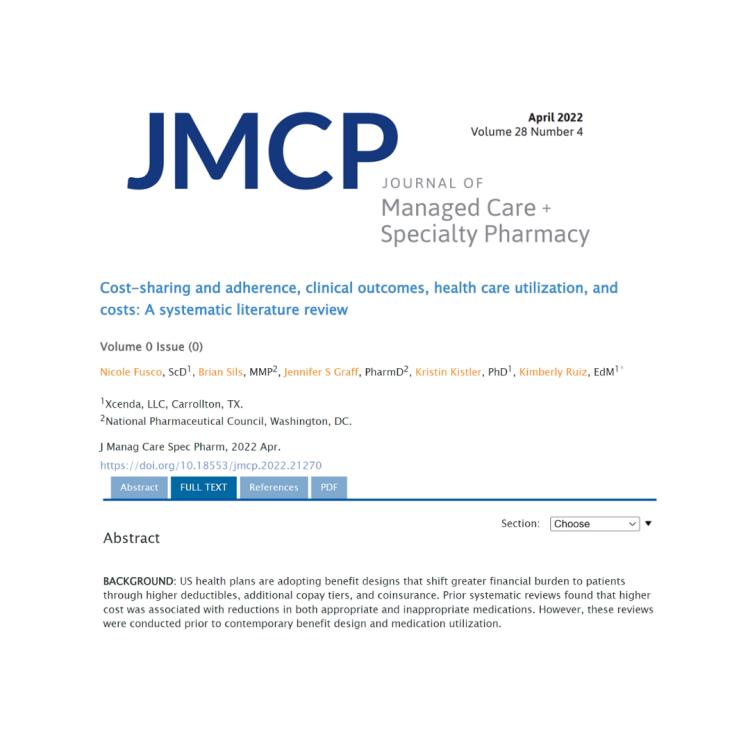 NPC Highlights
NPC Highlights

Benefiting Patients with Better Benefit Design
New studies point to an important takeaway in how decision-makers approach health benefit design: If we want patients to access treatments that lead to good health outcomes, benefits need to be built to enable it.
A systematic literature review led by NPC and Xcenda and published in the Journal of Managed Care and Specialty Pharmacy (JMCP) showed that higher patient cost-sharing for prescription medications leads to worse medication initiation, adherence, persistence, and discontinuation. An NPC-supported research study from the Employee Benefits Research Institute found that expanding pre-deductible coverage in Health Savings Account-eligible high-deductible health plans would ease access to care for chronic conditions while only increasing premiums between nearly zero to 1.5%.

Patient Perspectives on Innovation
As policymakers continue to debate drug price regulation, biopharmaceutical innovation could be on the line. What’s the real-world impact of that innovation?
As part of NPC’s ongoing video series, Innovation Matters, patient advocate Katherine Fielding, who was diagnosed with cystic fibrosis (CF) at age 1, discusses how the invention of modulator therapies has changed her life and how more innovation is needed for CF patients. Two patient advocacy leaders – Anna Hyde, vice president of advocacy and access for the Arthritis Foundation and Molly Murray of the Autoimmune Association – also discuss how innovation has impacted the patients their organizations serve.

A Case Study in Health Spending Research
At the recent ISPOR conference, NPC VP of Research, Michael Ciarametaro, MBA, introduced a case study spotlighting the missteps made in a West Health Policy Center analysis, which concluded that drug price regulation would have minimal impact on future innovation.
When evaluated against the guiding principles for conducting health spending analyses, NPC’s research team found significant concerns due to inadequate methods, unsupported assumptions, and conclusions not substantiated by the analysis. NPC’s guiding principles are designed to help stakeholders both assess health spending analyses and policies aimed at reining in health spending.
 ICYMI
ICYMI
-
Analysis on health spending – Commentaries from NPC President and CEO John M. O’Brien, PharmD, MPH, in Chain Drug Review and Pharmacy Times delve into policies aimed at curbing health spending and examine how they might impact patient access to care.
-
Comments on PBMs – Last week, NPC submitted comments to the Federal Trade Commission on the business practices of pharmacy benefit managers and increasing costs to patients.
-
The Orphan Drug Act – NPC recently examined the critical role of the Orphan Drug Act in fostering innovation for rare conditions.
-
Behind the latest health spending estimates – In a blog post, NPC's Dr. Phares examines the Centers for Medicare and Medicaid Services' national health expenditure report and explains what it means for the future of health spending.
-
NPC’s Annual Report – Read about our work in 2021 to lead policy-relevant research and analysis to foster evidence-based health policy discussions and decision-making, and watch the Year in Review video for highlights.
-
New NPC Team Members – NPC recently welcomed two new team members: Rochelle Henderson, PhD joined NPC as Vice President of Research and Nicole Reynolds Berry joined the team as Executive Assistant.
 Mark Your Calendar
Mark Your Calendar
AcademyHealth 2022 Annual Research Meeting
June 4 – 7
Join NPC’s Chief Scientific Officer Sharon Phares, PhD, MPH, and Health Policy Fellow Salama Freed, PhD, at this year's AcademyHealth 2022 Annual Research Meeting in Washington, DC, where they will delve into topics including wage level variances in specialty drug use and health care utilization and assess changes in medication use patterns due to COVID-19.
National Alliance 2022 Leadership Summits
June 27-28
NPC will be in Detroit as a sponsor and exhibitor at the 2022 National Alliance Leadership Summits. The two-day conference will host three summits focused on Fiduciary & Affordability, Rebuilding Trust & Transparency and Humanistic Health.
